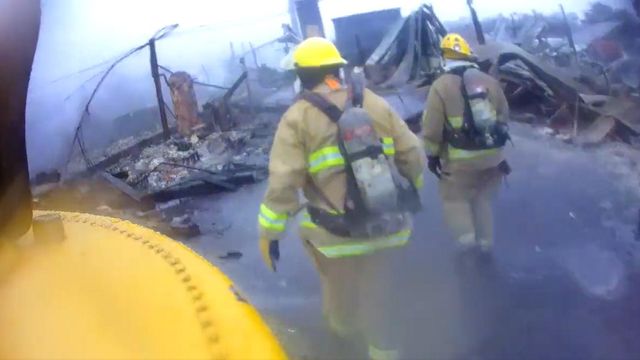Rain keeps drones away from still-burning Winston-Salem fertilizer plant, explosion risk remains
The massive fire that started Monday night at the chemical-filled Winston Weaver Co. fertilizer plant is still burning Thursday morning, crews said in a 5:15 a.m. update.
Posted — UpdatedThere were no significant changes overnight, lead investigators said. Although the flames are smaller and the risk of explosion has slightly lessened, the threat for a major explosion is still there. As a result, all emergency personnel are still working off-site, and thousands of people who live within 1 mile of the plant are urged to not return to their homes.
Rain fell overnight, which cooled the area and helped reduce the fire, according to Rick McIntyre, lead investigator with the Winston-Salem Fire Department. However, the rain has pushed the smoke lower to the ground, increasing the health hazard for everyone, especially those with respiratory issues.
Also due to the rain, drones were not allowed to fly over the site overnight, McIntyre said. Crews will have a more detailed update on the fire and explosion risk once daylight breaks.
A team of 12 people from different agencies is currently conducting interviews among staff and reviewing video footage to try and learn what happened. The fire investigation is ongoing.
On Wednesday, Winston-Salem Fire Chief Trey Mayo said people who live within a one-mile radius of the massive, long-burning fertilizer plant fire should stay away for their own safety until at least Thursday.
The fire has not shown any signs of improvement, Mayo said, but he was hopeful that rain forecast for Thursday and Friday could help diminish the fire at Winston Weaver Co.
Conditions were too unpredictable and dangerous for residents who live within a mile of the plant to return home, Mayo said, emphasizing that an explosion was still possible at any time.
No mandatory evacuation for those near Winston-Salem fertilizer fire
However, residents were not required to leave the area, according to Winston-Salem Mayor Allen Joines. Many reporters in Wednesday afternoon's press conference questioned why Joines or Gov. Roy Cooper have not ordered a mandatory evacuation considering the possibility of explosion. Mayo explained that it would take too many personnel for them to check and make sure everyone was out of their home.
It was unclear on Thursday how many of the estimated 6,500 residents remained in the one-mile radius as the fire burned for nearly three days.
Mayo said that the amount of ammonium nitrate fueling the fire — 500 tons — is more than double that present at a fertilizer plant in West, Texas, that exploded in 2013, killing 15 people. The fire has the potential to become the largest explosion in U.S. history, he said.
"I would like to strongly urge folks, if you are aware of this, if you have friends and family that are in this area that have not evacuated ... you need to leave that one mile area around the plant," Mayo said.
"As the fire burns, we are also losing fuel. It's what we could call, 'getting into the decay phase.' As it gets into the decay phase, the risk goes down," said Matthew Smith, with N.C. Hazmat Regional Response Team 5. But, the risk of a possible explosion has not decreased over the more than 36 hours since the fire began.
"I am not nervous, but I will tell you I have been in this business 33 years. And when I learned how much ammonium nitrate was on site last night, I felt as uneasy [as I've ever felt] at a fire scene," Mayo said on Tuesday. "When the fire department moves back a mile, it's difficult for me to understand why the ordinary citizen does not realize the gravity of that situation and move themselves back a mile also."
Mayo said that all of the employees who worked at Winston Weaver Co. were accounted for on Wednesday morning.
Firefighters battled the flames for two hours Monday night before the heat from the fire got too close to a rail car filled with ammonium nitrate, according to Winston-Salem Battalion Chief Patrick Grubbs. At that point, all crews were pulled back for their safety.
Officials said they no longer thought that the fire was going to reach the rail car filled with explosive chemicals, but were continuing to monitor the area just in case.
Ammonium nitrate in the air can irritate lungs, skin
According to the National Institutes of Health, ammonium nitrate is used to make fertilizers and explosives. It's also odorless and colorless. The chemical dissolves in water and does not readily burn, but will if mixed with combustible material. It also accelerates the burning of combustible material.
"It causes everything around it to burn," Mayo said.
On Tuesday, a hazardous materials expert at the scene said the impact of burning ammonium nitrate would be "more of an irritant" to the body, or something that could cause a rash, as opposed to causing severe illness or death.
People should avoid exercise or exertion if they can smell chemicals in the air.
Officials said air monitoring outside the perimeter on Tuesday morning revealed 65 parts per million of the chemicals. To cross the threshold into immediate danger or death, air monitoring would need to reveal 100 parts per million. Officials did not have an air quality update on Wednesday afternoon.
An estimated 500 tons of ammonium nitrate were in building in addition to the 90 tons in a rail car adjacent to the facility. There was also an estimated 5,000 tons of finished fertilizer at the plant, Mayo said on Tuesday morning.
Investigators looking into cause of fire at Winston-Salem fertilizer plant
Officials said they are not sure yet what caused the fire. The facility is inspected by the fire department yearly, Mayo said, and during the last inspection in December no violations of the state fire code were found.
Mayo did say that the site was not equipped with the proper sprinkler systems because parts of the building are more than 80 years old.
"I don't even think there was a fire code when this building was constructed," he said.
During Wednesday afternoon's press conference, reporters questioned Joines why the fertilizer plant was allowed in the community in the first place, citing concerns from neighbors who have wanted the plant out of the area for decades.
"This company has been there for 75 years. It's not something that just moved in," Joines said. "Right now it is operating legally, and there is really no legal way we could force them to move."
Sprinkler systems are required in the current state fire code, Mayo said, but when the building was built, sprinklers were not required.
A total of 150 first responders were helping with the fire, including fire, police and emergency management teams.
Schools cancel classes, prison evacuated due to risk of explosion from fertilizer fire
Firefighters went door-to-door on Monday night and drove fire trucks through neighborhoods with loud speakers to ask people to leave.
Since evacuation orders included off-campus Wake Forest University housing, the school canceled classes on Tuesday and Wednesday as a result.
Wake Forest students can go to the Wellbeing Center, Benson University Center and ZSR library. Students can bring a sleeping bag, pillow or blanket to be comfortable, university officials said.
University officials said they are working on long-term plans for those who don't have an alternative place to go.
Forsyth Correctional Center, which is within the 1-mile radius, was evacuated Monday night, and 220 inmates were transported to an empty minimum custody unit at the Alexander Correctional Institution.
Nearby North Hills Elementary, which is close to the evacuation radius, was closed Tuesday, and students were participating in online learning.
Related Topics
• Credits
Copyright 2024 by Capitol Broadcasting Company. All rights reserved. This material may not be published, broadcast, rewritten or redistributed.






